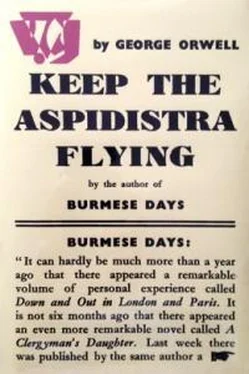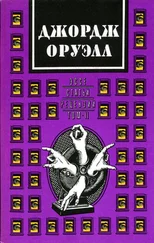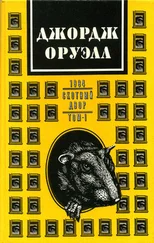'You think I'm a B.F., of course,' he remarked to the ceiling.
'No, I don't. Why should I?'
'Yes, you do. You think I'm a B.F. to stay in this filthy place instead of getting a proper job. You think I ought to try for that job at the New Albion.'
'No, dash it! I never thought that. I see your point absolutely. I told you that before. I think you're perfectly right in principle.'
'And you think principles are all right so long as one doesn't go putting them into practice.'
'No. But the question always is, when IS one putting them into practice?'
'It's quite simple. I've made war on money. This is where it's led me.'
Ravelston rubbed his nose, then shifted uneasily on his chair.
'The mistake you make, don't you see, is in thinking one can live in a corrupt society without being corrupt oneself. After all, what do you achieve by refusing to make money? You're trying to behave as though one could stand right outside our economic system. But one can't. One's got to change the system, or one changes nothing. One can't put things right in a hole–and–corner way, if you take my meaning.'
Gordon waved a foot at the buggy ceiling.
'Of course this IS a hole–and–corner, I admit.'
'I didn't mean that,' said Ravelston, pained.
'But let's face facts. You think I ought to be looking about for a GOOD job, don't you?'
'It depends on the job. I think you're quite right not to sell yourself to that advertising agency. But it does seem rather a pity that you should stay in that wretched job you're in at present. After all, you HAVE got talents. You ought to be using them somehow.'
'There are my poems,' said Gordon, smiling at his private joke.
Ravelston looked abashed. This remark silenced him. Of course, there WERE Gordon's poems. There was London Pleasures, for instance. Ravelston knew, and Gordon knew, and each knew that the other knew, that London Pleasures would never be finished. Never again, probably, would Gordon write a line of poetry; never, at least, while he remained in this vile place, this blind–alley job and this defeated mood. He had finished with all that. But this could not be said, as yet. The pretence was still kept up that Gordon was a struggling poet—the conventional poet–in–garret.
It was not long before Ravelston rose to go. This smelly place oppressed him, and it was increasingly obvious that Gordon did not want him here. He moved hesitantly towards the door, pulling on his gloves, then came back again, pulling off his left glove and flicking it against his leg.
'Look here, Gordon, you won't mind my saying it—this is a filthy place, you know. This house, this street—everything.'
'I know. It's a pigsty. It suits me.'
'But do you HAVE to live in a place like this?'
'My dear chap, you know what my wages are. Thirty bob a week.'
'Yes, but—! Surely there ARE better places? What rent are you paying?'
'Eight bob.'
'Eight bob? You could get a fairly decent unfurnished room for that. Something a bit better than this, anyway. Look here, why don't you take an unfurnished place and let me lend you ten quid for furniture?'
'"Lend" me ten quid! After all you've "lent" me already? GIVE me ten quid, you mean.'
Ravelston gazed unhappily at the wall. Dash it, what a thing to say! He said flatly:
'All right, if you like to put it like that. GIVE you ten quid.'
'But as it happens, you see, I don't want it.'
'But dash it all! You might as well have a decent place to live in.'
'But I don't want a decent place. I want an indecent place. This one, for instance.'
'But why? Why?'
'It's suited to my station,' said Gordon, turning his face to the wall.
A few days later Ravelston wrote him a long, diffident sort of letter. It reiterated most of what he had said in their conversation. Its general effect was that Ravelston saw Gordon's point entirely, that there was a lot of truth in what Gordon said, that Gordon was absolutely right in principle, but—! It was the obvious, the inevitable 'but'. Gordon did not answer. It was several months before he saw Ravelston again. Ravelston made various attempts to get in touch with him. It was a curious fact— rather a shameful fact from a Socialist's point of view—that the thought of Gordon, who had brains and was of gentle birth, lurking in that vile place and that almost menial job, worried him more than the thought of ten thousand unemployed in Middlesbrough. Several times, in hope of cheering Gordon up, he wrote asking him to send contributions to Antichrist. Gordon never answered. The friendship was at an end, it seemed to him. The evil time when he had lived on Ravelston had spoiled everything. Charity kills friendship.
And then there were Julia and Rosemary. They differed from Ravelston in this, that they had no shyness about speaking their minds. They did not say euphemistically that Gordon was 'right in principle'; they knew that to refuse a 'good' job can never be right. Over and over again they besought him to go back to the New Albion. The worst was that he had both of them in pursuit of him together. Before this business they had never met, but now Rosemary had got to know Julia somehow. They were in feminine league against him. They used to get together and talk about the 'maddening' way in which Gordon was behaving. It was the only thing they had in common, their feminine rage against his 'maddening' behaviour. Simultaneously and one after the other, by letter and by word of mouth, they harried him. It was unbearable.
Thank God, neither of them had seen his room at Mother Meakin's yet. Rosemary might have endured it, but the sight of that filthy attic would have been almost the death of Julia. They had been round to see him at the library, Rosemary a number of times, Julia once, when she could make a pretext to get away from the teashop. Even that was bad enough. It dismayed them to see what a mean, dreary little place the library was. The job at McKechnie's, though wretchedly paid, had not been the kind of job that you need actually be ashamed of. It brought Gordon into touch with cultivated people; seeing that he was a 'writer' himself, it might conceivably 'lead to something'. But here, in a street that was almost a slum, serving out yellow–jacketed trash at thirty bob a week—what hope was there in a job like that? It was just a derelict's job, a blind–alley job. Evening after evening, walking up and down the dreary misty street after the library was shut, Gordon and Rosemary argued about it. She kept on and on at him. WOULD he go back to the New Albion? WHY wouldn't he go back to the New Albion? He always told her that the New Albion wouldn't take him back. After all, he hadn't applied for the job and there was no knowing whether he could get it; he preferred to keep it uncertain. There was something about him now that dismayed and frightened her. He seemed to have changed and deteriorated so suddenly. She divined, though he did not speak to her about it, that desire of his to escape from all effort and all decency, to sink down, down into the ultimate mud. It was not only from money but from life itself that he was turning away. They did not argue now as they had argued in the old days before Gordon had lost his job. In those days she had not paid much attention to his preposterous theories. His tirades against the money–morality had been a kind of joke between them. And it had hardly seemed to matter that time was passing and that Gordon's chance of earning a decent living was infinitely remote. She had still thought of herself as a young girl and of the future as limitless. She had watched him fling away two years of his life—two years of HER life, for that matter; and she would have felt it ungenerous to protest.
But now she was growing frightened. Time's winged chariot was hurrying near. When Gordon lost his job she had suddenly realized, with the sense of making a startling discovery, that after all she was no longer very young. Gordon's thirtieth birthday was past; her own was not far distant. And what lay ahead of them? Gordon was sinking effortless into grey, deadly failure. He seemed to WANT to sink. What hope was there that they could ever get married now? Gordon knew that she was right. The situation was impossible. And so the thought, unspoken as yet, grew gradually in both their minds that they would have to part—for good.
Читать дальше








